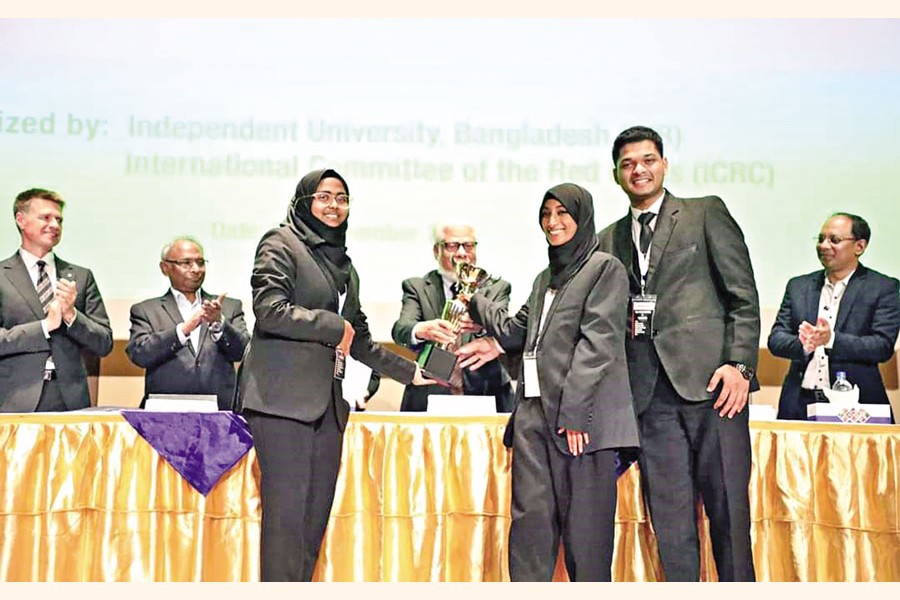15th Henry Dunant Memorial Moot Court Competition 2024
How University of Dhaka won

ABDULLAH-AAT-TAHMIDUS SIDDIQUEE
Published :
Updated :

The Dhaka University Moot Court Society (DUMCS) has continued its legacy of excellence by becoming champions at the 15th Henry Dunant Memorial Moot Court Competition 2024. This marks the third consecutive win for DUMCS in one of the most prestigious moot court competitions in the country.
The winning team comprised Rezoan Asraf, Anika Tahsina, and Jarin Anjum Tasnim--all undergraduate law students from the University of Dhaka.

The competition's national rounds were organised by the International Committee of the Red Cross (ICRC) in collaboration with the Independent University of Bangladesh (IUB) in November. The theme for this year's competition was the "Use of AI and Technology in Warfare". The final round witnessed a fierce contest between teams from the University of Dhaka and Eastern University, with the Team DU emerging victorious.
The story behind the team: The Henry Dunant Memorial Moot Court Competition focuses on International Humanitarian Law (IHL). DUMCS prioritised each member's prior experience and performance in similar-themed competitions to build the perfect team.
Among the members, Rezoan was the runner-up in the 4th PGCL SAARC International Moot Court Competition 2024, while Anika and Jarin participated in the IBA ICC Moot Court Competition 2024. Anika remarked, "Our prior experience played a huge role in building our amazing team synergy. This synergy helped us to perform our best, as exemplified by Rezoan being named the best mooter of the competition."
What set Team DU apart: Securing the championship was a product of Team DU's lengthy and methodical preparation process. The preparations were mostly focused on refining the core skills required to excel in moot court competitions. Jarin shared, "The two most crucial skills for success in mooting are advocacy and legal research." Advocacy refers to forming coherent arguments based on the details of the case and eloquently communicating those to judges and the audience.
The team members spent countless hours studying relevant cases, journals, and international laws to refine their advocacy and legal research skills. "In addition to these hard skills, soft skills such as the ability to respectfully disagree, public speaking, and being a team player were also crucial," Jarin added.
The Henry Dunant Memorial Moot Court competition stands out from other mooting competitions because the judges can ask questions and scrutinise the arguments of the participants.
The members extended their heartfelt gratitude to their coach, Psymhe Wadud, a lecturer from the Department of Law at Dhaka University, and their mentors for supporting and guiding them throughout the competition.
Challenges in Bangladesh's current legal education: The winners believe that Bangladeshi students could excel further, both academically and in extra-curricular activities if the standard of legal education in Bangladesh is elevated. They talked about a significant industry-academia disconnect in the current system. The members argue that the legal curriculum in Bangladesh needs to stay updated with the global standard. Rezoan explained, "The global legal scenario is very fast-paced and the only way to keep up with it is to revisit and update our legal education curriculum. In the current system, emerging law fields such as cyber law, labour law, and intellectual property law are not receiving adequate attention, leaving a gap in our knowledge base."
Jarin has also raised concerns about the lack of proper access to local and global legal resources. The high cost of legal materials, such as case studies and journals, makes it inaccessible for the average law student. The problem is further worsened as the university authority does not have adequate funds to purchase and provide these materials to the students.
Additionally, Anika opined that the legal curriculum should add interdisciplinary subjects to diversify their depth of knowledge. She also emphasised adding foundational courses such as English, public speaking, and legal interpretation to benefit students from diverse backgrounds.
Obstacles for aspiring lawyers: Aspiring to be a lawyer has its own set of unique challenges in the context of Bangladesh. The lack of adequate remuneration for junior lawyers makes the profession relatively difficult for those from modest backgrounds. Financial stability usually comes only after years of practice, which leads to lawyers struggling financially in the early years of their lives.
"Getting a licence to practice law, along with the apprenticeship itself, is quite lengthy," Jarin noted, "this tedious process ultimately seems unappealing to many students considering the career path."
The global legal industry leverages innovative tools and technologies to add efficiency to its legal efforts. However, Anika highlights that Bangladeshi legal industry is still heavily dependent on the sluggish traditional and book-based methods. This lack of modernisation effort ultimately obstructs aspiring lawyers from competing with their global counterparts. All these challenges are prompting more and more law students to pursue alternative legal careers, such as judgeships, government positions through BCS, and lucrative positions in international NGOs.
For the days ahead: For the members of Team DU, this success is just the stepping stone for a brighter journey ahead. Rezoan plans to work with international NGOs and leverage the experience to elevate Bangladesh's laws to the global standard and increase the general public's access to legal resources. Anika, being inspired by the martyrs of the recent revolution, pledges to implement reforms to make way for a more democratic Bangladesh. Jarin, still exploring career paths, promises to excel in all her future endeavours and bring pride to the country through her sincere efforts and contributions.
Being the winner, Team DU will represent Bangladesh in the 23rd Red Cross IHL Moot Court Competition in Hong Kong in March next year.
Abdullah-Aat-Tahmidus Siddiquee is currently a final-year student at the Institute of Business Administration, Dhaka University.
abdullahaat448@gmail.com


 For all latest news, follow The Financial Express Google News channel.
For all latest news, follow The Financial Express Google News channel.